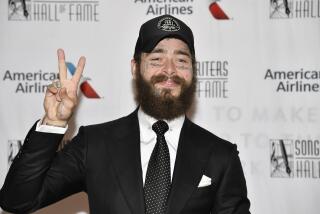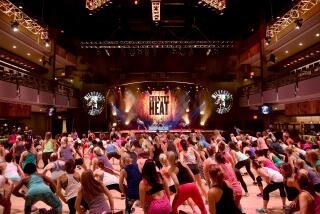Rulon Gardner makes no excuses
- Share via
For much of his storied sports career, two-time Olympic medalist Rulon Gardner was a slave to the scale. He used rigorous, hours-long workouts to keep his weight in check and relied upon old-school wrestling tricks — like exercising in a sauna — to drop unwanted pounds before a competition.
And when he retired from Greco-Roman wrestling — and keeping his weight at roughly 270 pounds — Gardner recalls thinking “I’ll never have to look at a scale again.”
Wrong.
The 6-foot, 1-inch wrestling legend is back on the scale each week, only now he’s doing it in front of millions of viewers as part of the cast of NBC’s reality weight-loss show, “The Biggest Loser.” Although the show’s ratings have sagged in recent seasons, the reality program continues to be one of the network’s biggest hits and the former Olympian has played a prominent role in the promotions this season.
Gardner makes no excuses for his weight gain. He stopped working out after he retired to let his body heal from years of physical abuse and injury that comes with competing at a world-class level. But he kept eating like he was still in training. In all, he gained more than 200 pounds since his retirement in 2004, conceding: “For a person who mastered his body and became a two-time Olympic medalist, that’s a sad thing.”
The Wyoming farm boy has survived an almost unbelievable string of near-death experiences as well as larger-than-life victories. As a kid, he was impaled by an arrow during a grammar school show-and-tell session, and years later, of course came the Sydney Summer Olympics in 2000, when Gardner pulled off one of the biggest upsets in Olympic history by defeating a man that many believed could not be beat — Russian Alexander Karelin.
Two years later, Gardner made headlines again when he was stranded for 17 hours in the snow and cold after a snowmobile accident. He lost a toe to frostbite but was soon back in training. Then, just weeks before he headed to the Athens Olympics in 2004, he was struck by a car while riding his motorcycle and suffered a wrist injury.
He couldn’t duplicate his gold medal victory in Athens, but he earned bronze. And after that final match, he left his size 13 shoes on the mat — a sign that he would never return to competitive wrestling. He retired to a life in Utah that included public speaking and an athletic training center and gym.
But he was soon back in the news again when the small aircraft he was traveling in crashed into a lake near the Utah-Arizona border on a frigid February night in 2007: It took almost an hour for the three men aboard to swim to land, only to face a night of sub-freezing temperatures once they got there. As luck would have it, they were rescued hours later by a fisherman.
Gardner, who said he relied upon his Mormon faith to see him through these brushes with death, said he adopted a “live every day like it’s your last” attitude. But that outlook also translated into never passing up a good meal or a fast-food restaurant. And before long, the man who had no problem wrestling for three hours at a clip was 474 pounds and had trouble walking down the street without becoming winded.
“I just didn’t want to see it, I kept ignoring it,” Gardner, 39, said during an interview at the “Biggest Loser” ranch located outside Los Angeles. “I just kept telling myself I was giving my body a break after all those years of competition, that I deserved it.”
The excess weight also hit closer to home: Gardner and his wife have been trying to have children, without luck. Part of the problem, Gardner said, was that “I was almost embarrassed to be intimate with my wife.” Instead, he would stay up long after his wife went to bed, and eat and eat.
Looking back on it now, Gardner said he believe he was eating as much as 14,000 calories a day. “I’d go home for dinner and on the way I’d get fast-food and stop at the convenience stores. If the sign said, ‘Candy bars, two for 99 cents’ I’d say ‘OK, I’ll buy six.’…That’s a problem.”
He hit rock bottom last year when he was inducted into the National Wrestling Hall of Fame in Oklahoma. After enjoying the banquet dinner, Gardner made a run through a fast-food drive-through and settled in to watch the ceremony highlights on the evening news. “I remember looking at the screen thinking, ‘Who’s that big guy? I don’t remember seeing him there.’ ”
Finally, a friend suggested he try out for “The Biggest Loser” and Gardner reached out to NBC. He said the only special treatment he received involved an early heads-up on when the casting call would be held in Utah in July 2010. He said he had to go wait in line like everyone else and make it through several rounds of interviews.
Gardner’s athletic background immediately makes him a front-runner for the $250,000 grand prize and the title of the Season 11 “Biggest Loser.” But trainer Bob Harper said Gardner has the opportunity to make an even bigger mark: Giving hope to a nation that just can’t seem to get a hold of its obesity problem.
“He let himself go,” Harper said. “I think a lot of people can relate to that. And if someone who gained 200 pounds can find a way to get up and fight back, that should be inspiring to a lot of other people who only have 40 or 50 pounds to lose.”
Gardner said there’s a chance he could have lost the weight on his own if he set his mind to it, although it would have taken months if not years. So far, in his first three weeks at the “Biggest Loser,” enduring hours long workouts each day and a diet of fewer than 3,000 calories, he lost nearly 60 pounds — a feat he says he does not think he could have duplicated on his own. “It would have taken me years to do what I’ve done in just a few weeks.”
He said that he has completely changed his eating habits. Before, lunch would be fast-food — burgers, fries and pizza. Recently, lunch was a slim 600-calorie meal that included a green salad and a sandwich made up of bread, mustard and a 3-ounce portion of ham.
As a man who knows a thing or two about second chances, he says that once he regains his health and fitness, there will be no going back.
“I’ve been given a lot, and I’ve thrown a lot away, and that’s embarrassing,” he said. “Now I’m getting the gift again.”
More to Read
The biggest entertainment stories
Get our big stories about Hollywood, film, television, music, arts, culture and more right in your inbox as soon as they publish.
You may occasionally receive promotional content from the Los Angeles Times.











